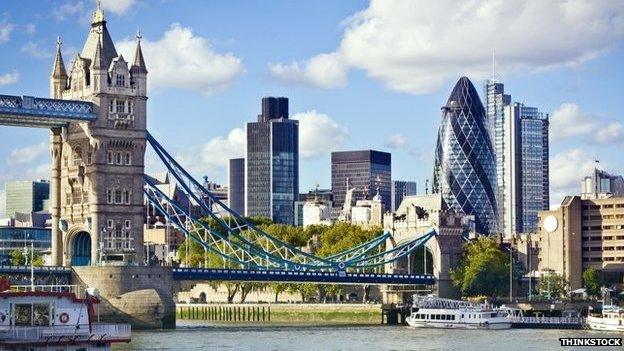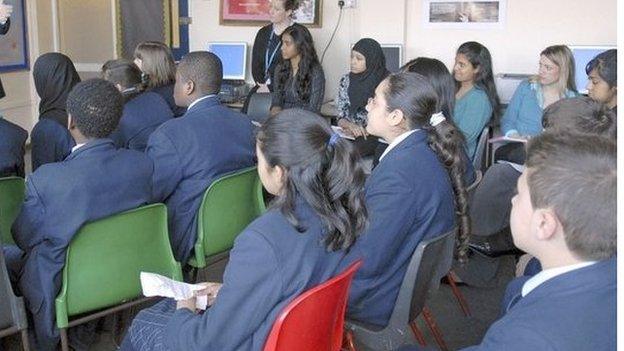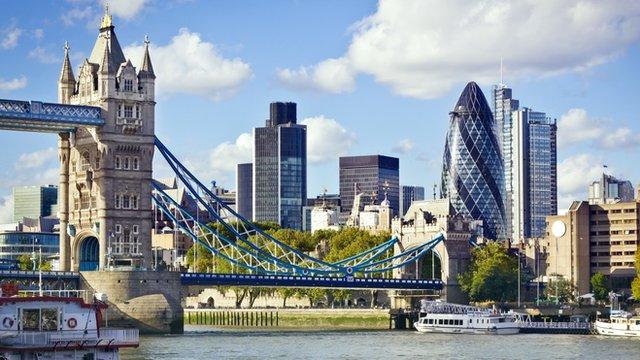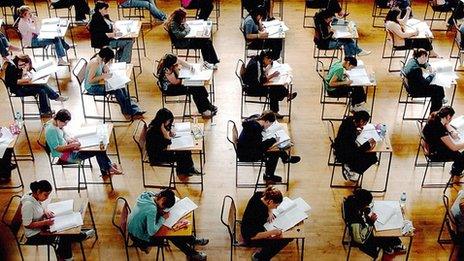Diversity 'key to London GCSE success'
- Published

The success of London's schools has challenged the idea of poorer pupils being likely to underperform
The high success rate enjoyed by GCSE students in London is explained by the higher proportion of ethnic minority pupils in the capital, research finds.
The report says the capital's diversity plays a key role in the "London effect" - a term used to describe the high levels of success among its pupils.
It says London has a low rate of the lowest progress group: white British.
The Bristol University study assessed GCSE data from 2013 for all pupils in state secondary schools in England.
Researchers at the university's Centre for Market and Public Organisation (CMPO) measured each student's GCSE points score across their eight best subjects, counting an A* as being worth eight points, an A as seven, and so on, to one point for a G.
They also analysed the percentage of people scoring five or more A* to C grades at GCSE.
Students' results were measured against their prior attainment in Key Stage 2 tests taken at the end of primary school.
Higher results
The results indicated that pupils in London's state-funded schools scored around eight GCSE grade points higher than those in the rest of the country.
This is the difference between gaining eight A grades compared with eight Bs, or eight Cs compared with eight Ds, the study says.
However, once children's ethnic background was factored in, the London effect in pupil progress was found to disappear, the report concludes.
White British pupils tend to achieve the lowest GCSE scores against their attainment at the end of primary school, compared with those from ethnic minority backgrounds, previous CMPO research has found.

London has more high-performing groups, the study finds
This group also makes up just over a third (36%) of Year 11 (15- and 16-year-olds) in London, while they make up around 84% of this school year group in the rest of England.
"London simply has a lot higher fraction of high-performing groups and a lot lower fraction of low-performing groups, principally White British pupils," the study says.
It says "being a recent immigrant or being of non-White British ethnicity has a very substantial positive effect on progress through school" as the children of immigrants typically have "high aspirations and ambitions, and place greater hopes in the education system than the locals do."
Researchers also assessed the impact of children of recent immigrants, rather than looking at ethnicity, and suggest evidence shows that this also plays a part in the London effect.
In Newcastle, around 12% of the population was born abroad and arrived in the UK before 2000, while in London 35% of the population did so. Comparing these two cities, there is a difference of around 15 GCSE grade points in pupil progress, with London ahead.
Aspiration and ambition
Prof Simon Burgess, who carried out the research, said: "We know that ethnic minority pupils score more highly in GCSEs relative to their prior attainment than white British pupils.
"London simply has a lot more of these high-achieving pupils and so has a higher average GCSE score than the rest of the country. My interpretation of these results leads to a focus on pupil aspiration, ambition and engagement.

Pupil aspiration, ambition and engagement is key, says Prof Simon Burgess
"There is nothing inherently different in the ability of pupils from different ethnic backgrounds, but the children of relatively recent immigrants typically have greater hopes and expectations of education, and are, on average, more likely to be engaged with their school work.
"This is not by chance of course. A key point about London is its attraction to migrants and those aspiring to a better life.
"The London effect is a very positive thing, and much of the praise for this should be given to the pupils and parents of London for creating a successful multi-ethnic school system."
The report is the latest in a number of research papers to analyse the success of London's pupils and schools.
In June, statistics from the Department for Education showed pupils on free school meals in inner London were more likely to go to university than their better-off peers outside the capital.
And in July, a paper by the Centre Forum think tank said the life chances of thousands of children would improve if schools across the country reproduced the results gained by poor pupils in London.
- Published12 November 2014
- Published30 June 2014

- Published27 June 2014

- Published2 July 2014